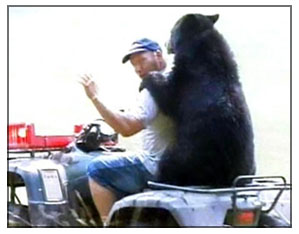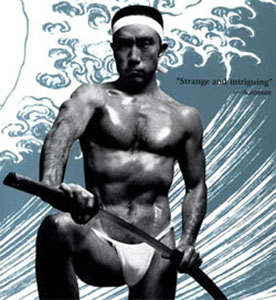7 'Eccentric' Geniuses Who Were Clearly Just Insane
Is it possible to be too smart? Maybe. History is full of insane geniuses, humans who mentally put the pedal to the metal--and sometimes through the floor.
Here are seven brilliant men who seemingly over-revved the neurological engine, who watched as the gearbox and chassis of their brains flew off onto the roadside...and kept on accelerating.
Pythagoras, Greek Mathematician, around 575 -500 B.C.

The Genius:
Yes, this is the guy who came up with the Pythagorean theorem we all learned in school ("The square of the hypotenuse of a right triangle is equal to the sum of the square of the other two sides").
Apart from this pillar of trigonometry, Pythagoras was the first high-profile academic to insist that natural phenomena could be explained mathematically (paving the way for the study of Physics) and was even a major inspiration for Plato's theories of democracy. So, yeah, we can thank him for, like, half of the good things ever invented.
The Insanity:
Much like L. Ron Hubbard and David Koresh, Pythagoras founded his own religion. Much like L. Ron Hubbard and David Koresh, Pythagoreanism was totally insane. How insane? To put it concisely, the square of the insanity of Pythagoreanism is equal to the sum of the square of the insanity of other religions.
Pythagoras' religion had two primary tenets: souls are reincarnated, and beans are evil. Not metaphorical beans, or metaphysical beans, but just plain, edible beans.

"Aaaaaahhhhh!"
Amongst other absurdities, Pythagoreanism's greatest commandments include:
-Do not, under any circumstances, eat beans
-Smooth out all bodily indents on pillows and/or beds
-Do not step over a crossbar
-Do not sit on a quart
-Do not walk on highways
-Do not leave the pot's impression in the ashes after removing it from the fire
-Do not stir a fire without iron
-Do not let swallows nest under the roof
Pythagoras' sect had more understandable rules, such as vegetarianism and pacifism, but he tended to break those. The vegetarianism rules were bent when, upon discovering his famous theorem, he celebrated by slaughtering an ox. His message of pacifism suffered greatly from his dying in a fight.
Lord Byron, English Poet, 1788-1824

The Genius:
Widely considered second only to Shakespeare in English poetry, Lord Byron published his first poetic work at 14, an age when our most profound thought was that girls might possibly be more awesome than video games. Renowned for his wit and versatility, Byron's Don Juan remains one of the few poems most of us can name when trying to seduce drunk English majors.
The Insanity:
It began when Byron arrived at Cambridge, where he was ordered to send his dog back home as keeping one was against school rules. Desperate for a pet, Byron scoured college policies for an animal not expressly forbidden. He found no reference to bears.
The bear stayed with Byron in his dorm room. Being a responsible pet owner, Byron took it on regular leashed walks through the university, terrifying fellow students and lecturers. When asked by administration what purpose the bear served on campus, the poet tried in vain to get his beast a fellowship.

Above: Lord Byron and his bear on their 4X4 ATV.
And where most people mellow out after they leave school, Byron decided to take his crazy to a whole new level. We'll let this quote from one of his friends tell the story:
"Lord B's establishment consists, besides servants, of ten horses, eight enormous dogs, three monkeys, five cats, an eagle, a crow, and a falcon; and all of these, except the horses, walk about the house, which every now and then resounds with their unarbitrated quarrels, as if they were the masters of it."
(later)
"...I find that my enumeration of the animals in this Circean Palace was defective, and that in a material point. I have just met on the grand staircase five peacocks, two guinea hens, and an Egyptian Crane"
That's from Percy Shelley (a fellow poet and husband of Frankenstein author Mary Shelley). If you're not seeing the problem with turning your house into Noah's Ark, then you're not imagining the sheer amount of shit these animals produce.

Later on in life, Byron's tendencies for playing zoo keeper switched to tendencies for playing war admiral. He constructed two small stone forts on the edge of his lake and launched a fleet of toy ships, which he would spend whole days directing while crouched in his fort. At Byron's insistence his servant, Joe Murray, would lie prone on a small boat in the lake and "command the ships" which we're guessing consisted of pushing them around and making cannon noises with his mouth.
Records concerning how much Joe Murray was paid to put up with this sort of shit are unavailable.
Tycho Brahe, Danish Astronomer, 1546-1601

The Genius:
Tycho Brahe is renowned for the magnificent precision of his astronomical measurements. At a time when telescopic astronomy was young and crude, Tycho assembled an array of data whose accuracy facilitated numerous discoveries, including the laws of planetary motion by his assistant, Johannes Kepler.
Also, check out the 'stache.
The Insanity:
Let's suppose you were high up in social circles and often compelled to give dinner parties. Let's also say you wanted to impress your high-profile friends and reassure them that their good faith and finances were in safe hands. What would you do?
How about hiring a dwarf, dressing him up as a clown, and without any explanation having him sit silently underneath the dining table for the duration of the dinner? Tycho Brahe did it, and he was a lot richer than you.

In order to protect journalistic integrity, it's worth explaining that the above may misrepresent Tycho. "Hiring" can suggest a casual, occasional employment. Tycho's dwarf was full-time. His tasks included sitting underneath the table when Tycho (and sometimes friends) ate, and just hanging around the house.
Tycho was renowned as a heavy drinker, so maybe he hired the dwarf in a drunken stupor and just never had the heart to tell him to leave once he sobered up. Otherwise it's safe to say the man was a few planets short of a solar system.
Michelangelo, Italian Renaissance Painter, 1475-1564

The Genius:
In all of art history, only four artists have ever warranted a Teenage Mutant Ninja Turtle. Michelangelo was one of them. His painting of God Creates Adam on the Sistine Chapel remains the most celebrated wallpaper of all time. Despite his place among the historical elite of painters, he had little respect for paint as a medium and branched to other arts including sculpture (The Statue of David) and architecture (St Peter's Basilica).
The Insanity:
Michelangelo ignored even the most basic tasks of self-maintenance. Not only did he bathe "very rarely" (by 15th century Italian standards, no less), he rarely even changed clothes, sleeping in full regalia--shoes included. His assistant once complained that, "He has sometimes gone so long without taking (his shoes) off that then the skin came away, like a snake's, with the boots."

Ew.
That sort of thing has caused some to speculate that he suffered from autism. He showed all of the signs, including struggling with social interactions (though it probably didn't help that he was covered in filth all the time). He would rarely speak to others, hated doing so, and had a tendency to end encounters by walking away mid-conversation. When his brother died, Michelangelo skipped the funeral.

The artist who made this smelled like poop.
If true, it was also his autism that let him focus on his work obsessively, to the sacrifice of absolutely everything else in his life. So it was the kind of autism that allowed him to become world famous in his field. As mental illnesses go, you could do worse.
Nikola Tesla, Physicist & Engineer, 1856-1943

The Genius:
Finally getting the posthumous credit his work deserves, Nikola Tesla offered an astonishing number of contributions to science. Our personal support of Tesla is already well documented. And again. But, you don't have to take our word for it. Labeled by Robert Lomas as "the man who invented the 20th century", Nikola Tesla played a major part in the discovery of:
-Radio
-A/C Electricity
-Computers
-Robotics
-Radar
-Ballistics
-Nuclear Physics
The Insanity:
Tesla suffered from Obsessive-Compulsive Disorder. So, for instance, where Michelangelo's personal hygiene was appallingly bad, Tesla's was appallingly good--cripplingly so. Tesla was a severe germophobe and refused to touch anything bearing the slightest hint of dirt. Tesla also refused to touch anything round, which makes some quite obvious hurdles for an engineer.

Apart from dodging germs and round objects, Tesla's OCD manifested itself in threes. Before entering a building, he would walk three times around the block. When staying in hotels, he insisted on a room number divisible by three. At each meal, he would use 18 napkins: three stacks of six.
Why he needed 18 napkins instead of, say, three, indicates that he apparently was not afraid of a nice rack of barbecue ribs.
Empedocles, Greek Scientist & Philosopher, 490-430 B.C.

The Genius:
Empedocles may have been among the most renowned geniuses in history if not for the fact that his stunning contributions to science are offset by his even more stunning contributions to bullshit. Some 450 years before Jesus, Empedocles discovered:
-That light travels at a speed
-That Earth is a sphere
-Centrifugal force
-That air is a substance, not an absence of substance.
-An (admittedly very crude) theory of evolution
-The Italian school of medicine
The Insanity:
Empedocles believed he was a god. Not in the 80's hair-band sense or the guy who can beat Mario Bros 3 in 11 minutes sense, but in the literal thunderbolts-from-the-sky and immortality sense. To prove his immortality to his understandably skeptical peers, Empedocles announced that he would jump into a volcano--Mt Etna--and pop back out unscathed.

From the words of none-too-impressed poet Richard Osborne:
"Great Empedocles, that ardent soul;
Leapt into Etna, and was roasted whole"
Yukio Mishima, Japanese Author, 1925-1970

The Genius:
By age 12, Yukio Mishima had acquired a comprehensive knowledge of Oscar Wilde. At 24, he published Confessions of a Mask, which hoisted him to the top of Japanese literary circles. Over the next 20 years he published another 20 major works, was nominated for three Nobel prizes, and solidified his status as the most recognized novelist in Japanese history.
The Insanity:
The image you see up there is the cover of Mishima's essay, "Sun and Steel", featuring the author himself in his samurai sword/jockstrap combo. We've included text below for posterity, but any further argument for his insanity is probably redundant after having seen that picture.
In 1968, Mishima founded the cult Tatenokai, or Shield Society. The cult consisted exclusively of himself and homo-erotically well-physiqued teenage boys. They spent their time lifting weights, practicing martial arts, and swearing their unconditional devotion, not to Mishima, but to the Emperor of Japan.
On November 26, 1970, Mishima stormed the Japanese defense headquarters with the intention of overthrowing the country by coup. His forces consisted of:
-Four homo-erotically well-physiqued teenage boys
-A sword
With tremendous foresight, he soon realized he was a little under-equipped, and took to the balcony to recruit defense force personnel.

In a fervent speech, he asked a group of bewildered gawkers to hand up their lives for the Emperor, do whatever the Emperor asked of them, and accept the Emperor as divinity. There were two problems with his message:
1. It was 1970. The Emperor held zero political influence over Japan. He existed for people to wave at once a year and was in no peril whatsoever. The idea of dedicating one's life to his protection was the Japanese equivalent of asking people to give their life for Punxsutawney Phil.
2. The Emperor himself was nothing but embarrassed by the cult, publicly refuted his own divinity, and asked only that Mishima and his chiseled cabaret act leave him alone.
Unsurprisingly, Mishima's speech yielded a total of 0 recruits. Mishima stepped down from the balcony, returned to the room which he had barricaded, and committed Seppuku--ritual suicide. We're assuming this was most people's first clue that he was actually serious.
Read The 5 Most Baffling Sex Scenes in the History of Fanfiction for some prose that might drive you to insanity. Or check out The 5 Most Badass Presidents of All-Time for the stories of men who might have ended up in a white padded cell instead of the White House if they were born today





